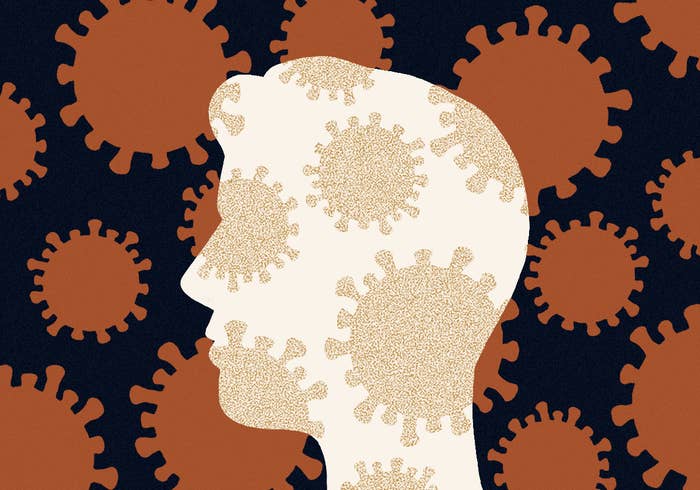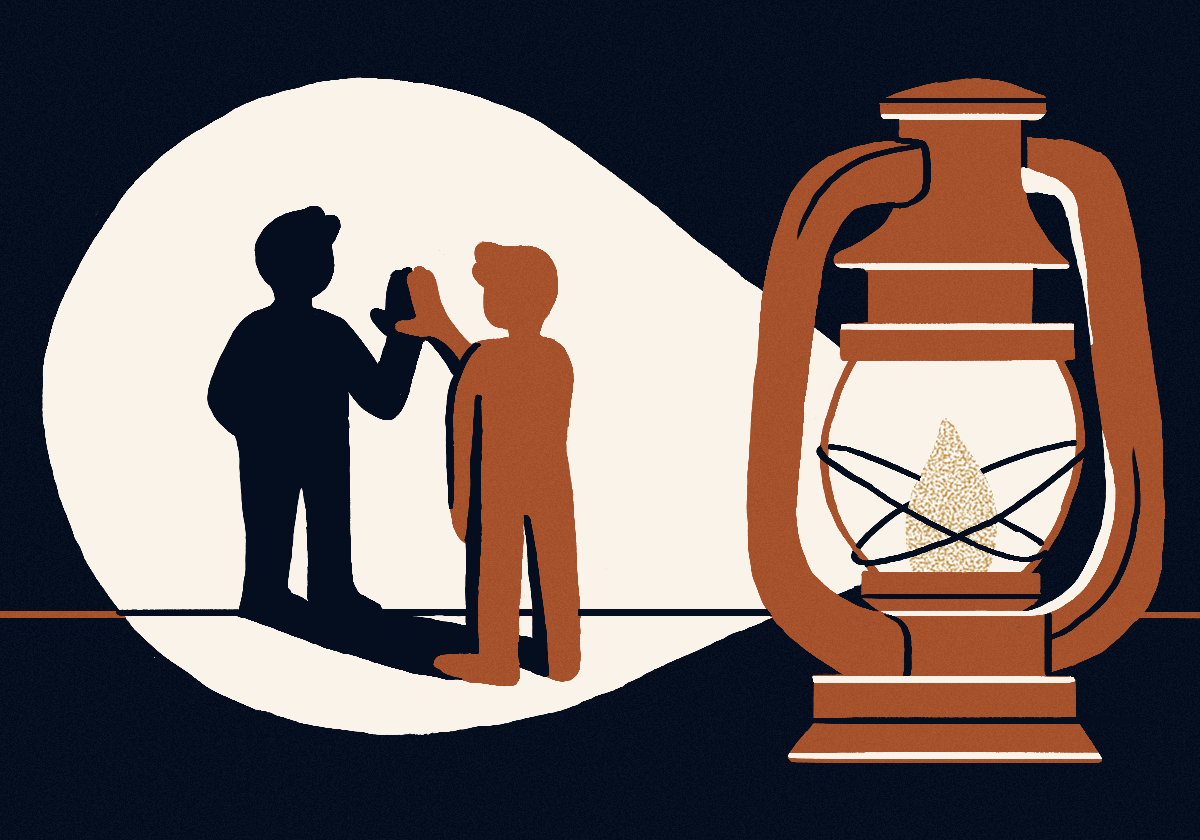
If I'm Fine, You're Fine
When COVID-19 touched down on American soil in March — that day when the NBA and Tom Hanks suddenly turned the country on its head with announcements of a canceled basketball season and an infected actor's quarantine in Australia — I was on Reddit, reveling in a two-hour rabbit hole of some hapless cryptocurrency echo chamber. Pretty standard for me. At some point, I figured I would do my due diligence, pivot away from wasting time on Bitcoin subreddits, and do a little research on the coronavirus. I owed it to myself, as a 26-year-old with clinical depression, to see if this was something that could meaningfully derail my mental health.
I was only 30 minutes into my reading when I became convinced that not only was there nothing to worry about, but also people's concerns and fears were hyperbolic and misinformed. My decision was immediate and final, and my plan was to change nothing and live my life normally. I would hold steady to my rigid schedule and habits, and my dedication would make me resilient in the face of the impending restrictions and societal upheavals. Totally foolproof, dude.
I held steady to this belief for many weeks. Barrages of panicked text messages and tweets disrupted the quiet equilibrium of my regular group threads and social media homepages, and I had to bite my tongue (thumbs actually) so I didn't drop eye roll emojis in response. But sometimes I slipped, coming across as anti-intellectual and, most dramatically, dismissing as overreactive those who said COVID-19 was giving them anxiety or making them depressed; because if anyone knew depression, it was me. And they did not have permission to wear it like a badge of honor.
It was the "If I'm fine, you're fine" mentality. I was that guy.
Mental Health, Comedy, and the Queer Community
As a gay man, I am deeply troubled by the number of queer people who experience depression, anxiety, or have attempted suicide. Queer people are more than six times as likely to experience depression, twice as likely to feel suicidal, and four times as likely to attempt suicide than their non-queer peers. And for queer people of color, especially trans people of color, the statistics are even worse.
I've personally struggled with depression for the better part of my life and have been ashamed to live with and talk about it for equally as long. If we're getting scientific, I actually have major depressive disorder; because modern psychiatry has a tendency to make things sound far worse than they actually are. Great, you have depression? Let's call it major. Yeah, I think that's good — major.
"As COVID-19 expanded, the memeification of mental health intensified so much that it obscured who had mental health struggles and who exploited mental health for engagement"
Throughout the pandemic, especially in the queer community, I've seen several tweets, Instagram posts, comments, and exchanges about mental health articulated through comedic discourse. But even before the pandemic, jokes about mental health pervaded Twitter feeds and meme accounts, this was not a novel phenomenon. As COVID-19 expanded, the memeification of mental health intensified so much that it obscured who had mental health struggles and who exploited mental health for engagement. In my mind, if people continued to use anxiety and depression as punchlines, this attitude would eventually cannibalize the space for other discussions to exist at all. I was scared those struggling with their mental health might be overshadowed, and it made me angry.
What angered me most was that I never saw any of these people speak sincerely about mental health ever. When they did, it was through cheap meme talk, so they couldn't possibly be experiencing mental health concerns of their own. These people have never experienced depression in their lives. They can't make jokes. They haven't earned their stripes. It felt as if this shortsightedness was something people could not see, and it turned me bitter.
It just wasn't fair. It felt as if people encroached on part of my identity, hijacked it for a quick ride, and then tossed it aside after a few hours like forgotten Internet detritus or single-use plastic.

My Depression Is a Shitty Lantern
We depressed people have the unique blessing of feeling like something is always wrong. The person next to you in the elevator took a half step to the left when you entered? Can't you read body language? A whole step left would be normal, but a half step? Not good. Maybe it's because you smell like shit, you idiot. Or perhaps it's your deodorant, which, by the way, is definitely giving you cancer.
It sounds exhausting, and yeah, it definitely can be at times. Some researchers consider depression merely a disease of excessive introspection. It's why many depressed people are smart, creative, and intuitive, but it's also why they so easily fall victim to the vicissitudes of the mind.
Instead of shining a spotlight on parts of the mind, depression turns on a lantern, revealing everything at once. Depressed people's flashlights are a little too bright, and sometimes they show a little more than what's desired. Shining a light on your upbringing or that one time you faked a stomachache at your Bar Mitzvah party so you wouldn't have to dance with girls isn't something that really serves you. But depression doesn't discriminate: It shows it all.
Personally, I've spent my entire life dealing with the shittiest goddamn lantern, dimming it down to an average level and thinking it would help me blend in with the people for whom the concept of happiness and stability come so easily.
Accordingly, I've lived most of my life with a cautious hand on the dimmer, always watching for those spontaneous moments when the lantern erupts into a blinding fluorescence. It's exhausting, so I hated it when people talked about it and made jokes without first earning their stripes.
I Was an Asshole
It seems logical that a global pandemic and subsequent social restructuring might make one's depression feel even more major. For me, however, that wasn't the case. Because I'd lived with depression for more than 15 years, I'd become an expert in what worked for me and what didn't. In fact, I'd tried a litany of medications, therapy styles, and holistic approaches that had finally led me to a place where my depression didn't have to always feel major.
Still, when governments and leaders began to forecast grim social outlooks and employ highly restrictive measures to combat COVID-19, it felt as if someone was trying to pour black ink all over my mental health playbook and the routines I've worked so hard to maintain. On top of that, people began posting about how the pandemic was making them "OCD about germs" or "so depressed that restaurants were closing." And that really pissed me the hell off. All around me, the world started panicking ad nauseam. People worried about what their lives would look like in this dark and fearful future all the while co-opting the language of mental health to express their emotions.
How did I react? Defensively. COVID-19 made me bitter, and I found myself unable to sympathize with the people around me. Their struggles annoyed me. I didn't want to be around them, and I rejected their fears and concerns. When I saw people exhibiting their own versions of anxiety and depression — while I had my own depression under control — I was outraged. My not-clinically-depressed friends didn't deserve the right to be responding this way. They didn't earn the right to use my language. They don't have depression. I do. If I can thrive in this environment, they should, too.
I'm pretty sure you can see where this is going. I was an asshole. While I never intended to come across as anti-intellectual, I did, and it was through a cocksure and fractured lens.
Mushrooms, M&Ms, and a Phoebe Bridgers–Induced Musical Catharsis
This brings me to my experience with magic mushrooms, which mended my fractured lens and gave me the kaleidoscopic worldview I desperately needed. As a firm believer in psychedelics' therapeutic potential, I've seen firsthand what they can do to treat mental health disorders. I've been interested in psychedelics' effect on depression for many years and have personally experienced how they can radically change negative thought patterns and destructive mental schema. So around late June, I had just finished reading Michael Pollan's How to Change Your Mind, an overview of psychedelics' history and their promise in treating mental health disorders, and decided to make a change.
I knew something was up and I didn't enjoy feeling spiteful, so I turned to mushrooms to lead me out of the mental mud, muck, and mire I found myself in. And it wasn't until my rapturous rendezvous with mushrooms and Peanut Butter M&Ms — which are objectively the best M&Ms — that I realized my scorn toward the people using jokes to talk about depression was really about something else. It was about something much more personal.
Besides writing "OPEN UP TO LOVE!" and other cliché platitudes in an old notebook (it's honestly too cringe to open it ever again), I was fortunate to have a little tête-à-tête with my brain, one that provided me the rare opportunity to see my emotions and behaviors through an outsider's perspective.
With a bloated stomach of M&Ms and psilocybin, I was cross-eyed listening to Phoebe Bridgers on a comfortable blow-up mattress when an insightful realization hit me: My un-empathetic behavior was just a classic case of projection. I was reacting the way I believed others reacted to me and my depression, that it annoyed people, it was something that people didn't want to be around or hear about, and it was something that people would reject me for. How I thought people perceived me was precisely how I was perceiving them.
There was a little selfishness there, too: Everyone else's COVID-19–induced mental health struggles made me realize that there was a level of sameness between myself and others, and I didn't like that. Why? I was clutching to the idea of depression as something that I owned, a quality not just inextricably linked to me but also the major characteristic that defined me.
And although some of these people were the very ones I felt contributed to the trivialized language of mental health, I realized my emotions were rooted in selfishness rather than in a socially conscious drive to make a difference.
The topic of mental health is unique in that it's deeply personal for each individual. Unfortunately, each person's mental health is experienced alone, is self-contained, and solipsistic, so it's impossible to really understand the fundamental nature of another person's suffering. Some people make jokes. Some eat shrooms. Some have a good cry. Some can't feel anything at all. It's essential to be open to each experience. It can help other people, and who knows, maybe it could even help ourselves.
This realization was a decisive moment in my mental health journey, and it also helped me recognize that I had an unhealthy attachment to my depression. For me, all it took was a meal of magic mushrooms, M&Ms, and a Phoebe Bridgers–induced catharsis to see it clearly.
The Caveat to Treating Mental Health as Comedy
For whatever reason, we sometimes cling to the things that hurt us the most, and in doing so, we overlook the possibility that perhaps we're holding on to pain more tightly than it's holding on to us. I have had to let go of that attachment and understand that mental health doesn't exist in a vacuum; it stands in relation to the people around us.
And people around me are having a tough time.
That is why it is imperative, now more than ever, to have discussions about mental health to prevent these psychological effects from worsening or lingering far longer than they should. While people should be free to speak about their mental health however they choose, we are doing ourselves a disservice to the world if we do not have open, honest, and informative discourse. One of the most important things we can do is speak openly about our pain, externalizing it so the people we love can help take on its burden. Comedy is one way to get the conversation started, but it only goes so far.
"This mindset has multiplied all over the internet, and all of a sudden, we've arrived at a place where mental health is trivialized, and the discourse surrounding it has become a cheap simulacrum of what it's actually like to live with a mental health illness."
Somewhere there's a kid on TikTok learning that the best way to talk about their mental health is through self-deprecation or comedy. The kid learns that mental health should be a fun and quirky part of their personality, that the cool thing to do is make a joke about it and not show any vulnerability. While I'm all for taking comedic ownership over your mental health, we cannot hide behind comedy as the only method by which we can talk about it.
This mindset has multiplied all over the internet, and suddenly, we've arrived at a place where we trivialize mental health, and the discourse surrounding it has become a cheap simulacrum of what it's actually like to live with a mental health illness.
So while I still get kind of annoyed when all I see are jokes about depression and anxiety, I'm quicker to realize that instead of getting annoyed or upset, the best path is to encourage the conversation, move it forward, and remove all judgment. If more people did so, I think a lot of us would be better off.
So Now What?
I think it's understandable why many of us in the queer community turn to humor to cope with mental health. There's a long and dark history of society pathologizing our mere existence as a mental illness in and of itself. To use humor is to negate that, fight back against that history, and make room for a little lightheartedness. In my opinion, I think some of us don't speak honestly about mental health because it feels like an admission of weakness or, even darker, gives credence to the irrational fear that those pathologizing queerness were right all along.
That's something I've felt about myself and my identity, at least. I also think I would never talk about my depression publicly because I didn't want my pain to be the pain of others. So instead, through my 15-year journey of mental health struggles — the emergences and my denials, the relapses and my defeats, the remissions and my triumphs — I treated my depression by adopting the most rigid habits and being the most productive I could be. I told myself I earned that badge of honor and that I was somehow the authority on how people could talk about mental health. There might be some truth to it, but it doesn't matter. I needed to look at my depression as a tool to tune in to the struggles of others — not as proprietary. While I'll always be concerned about how people speak about their mental health, I'm much more committed to making the conversation actually mean something.
During so much of the pandemic, it felt as if people tried to pirate the S.S. Depression, my chaotic but beautiful barge I've studied and sailed for years, and I felt as if they wanted to commandeer it.
But that's not true.
Many of these new passengers didn't choose to come aboard; they just ended up here, flailing against the turbulent tides, frantically pacing the deck, and feeling like they could crash into an iceberg at any moment.
COVID-19 has illuminated within me a deep understanding of mental health during a crisis, particularly the mechanisms by which people grow fearful, paranoid, depressed, helpless, and lost. At the start of this global crisis, I found myself playing the part of the pugnacious prick who told struggling people to just get over it or that they didn't deserve to be depressed. Through the duration of the pandemic, however, I've seen how COVID-19 can deepen our shared experience of isolation and come to understand that the best thing we can do — when focusing on ourselves makes us feel worse — is extend ourselves to others, further the conversation, and ask ourselves if we can take things a step further.
Being open to others might not be the panacea that eradicates stigma, but it does allow the mind to reconstitute itself, alleviate the vertigo, and make peace in the universality of our pain.
No one wants to steal my ship; they just want to ride it to safety, just like me.
Now that more of us are aboard the ship, we have a better shot at steering it.
Jackson Rickun is an actor and writer based in Los Angeles who has been described as funny "only some of the time." He is passionate mental health, wellness, music, and screaming into the void about Bitcoin and blockchain.
To learn more about depression, check out the resources at the National Institute of Mental Health here.
If you are thinking about suicide, talk to someone. You can speak to someone by calling the National Suicide Prevention Lifeline at 1-800-273-TALK (8255) and/or by texting HOME to 741741, the Crisis Text Line. Suicide helplines outside the US can be found here.
More resources: ✨
• Everything You Could Possibly Want To Know About Therapy
• 13 Inclusive Therapy and Mental Health Resources For BIPOC
